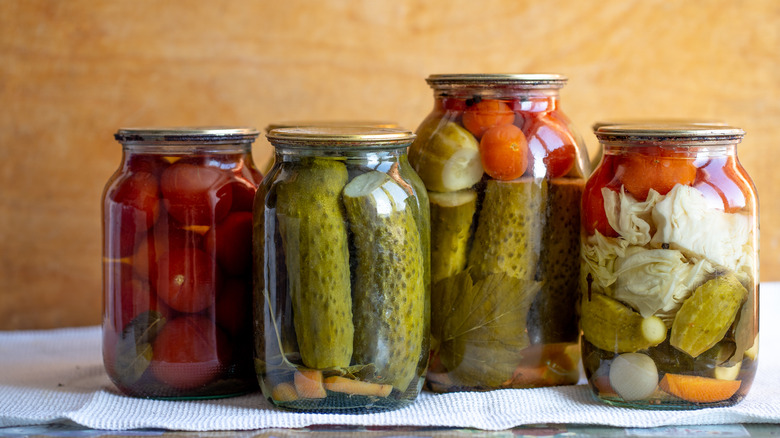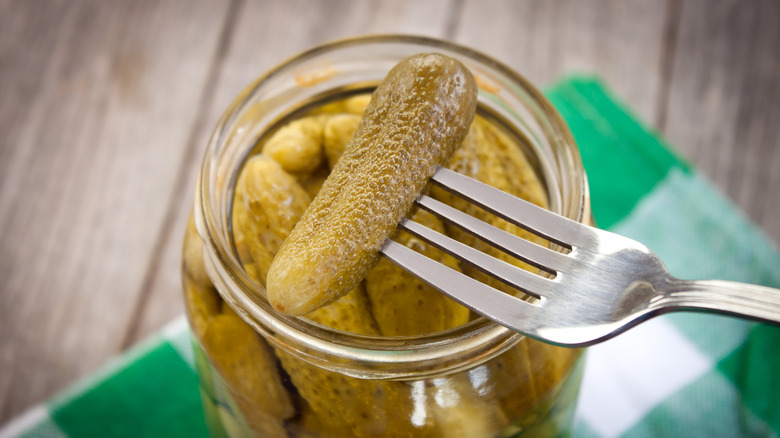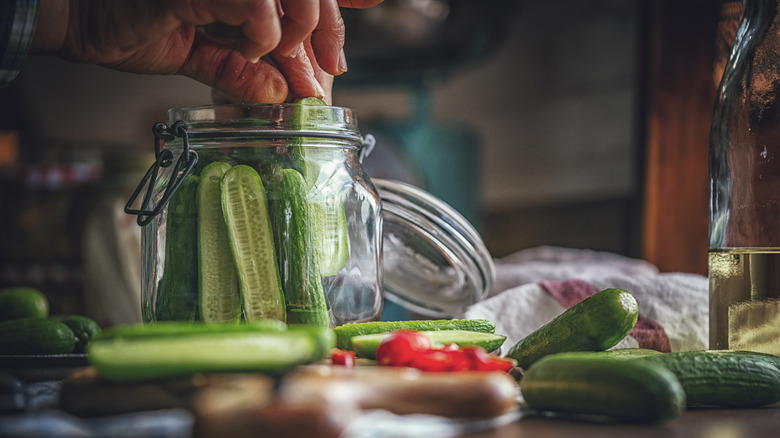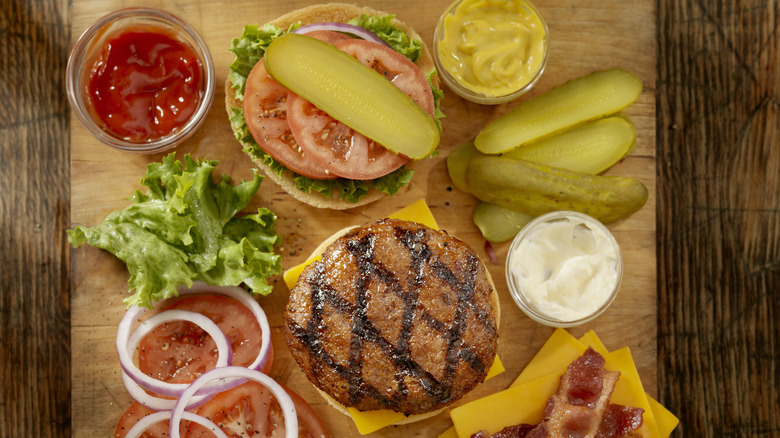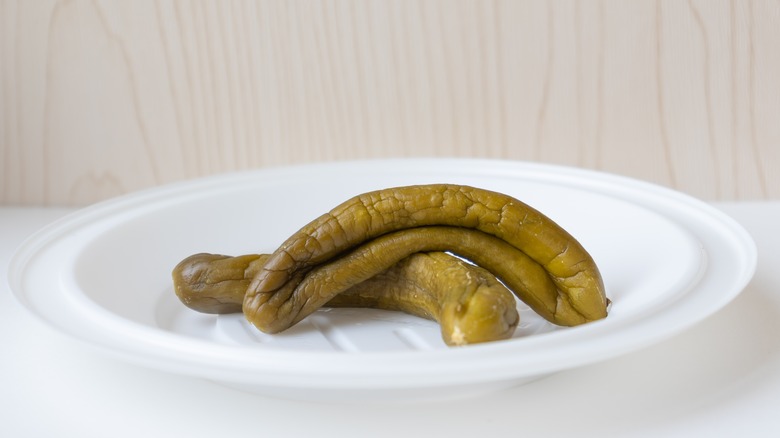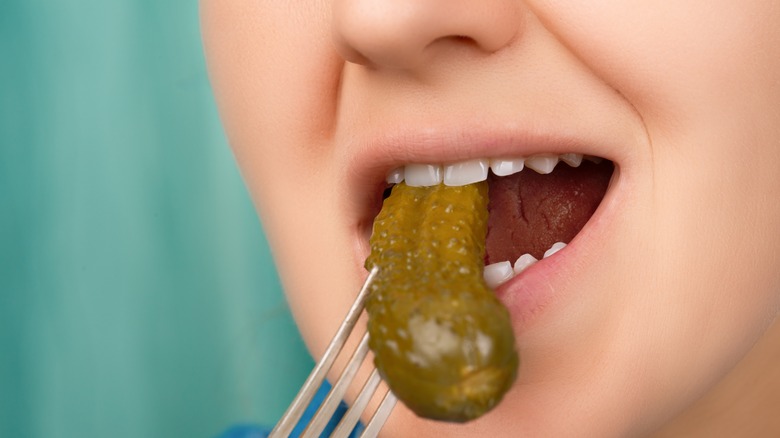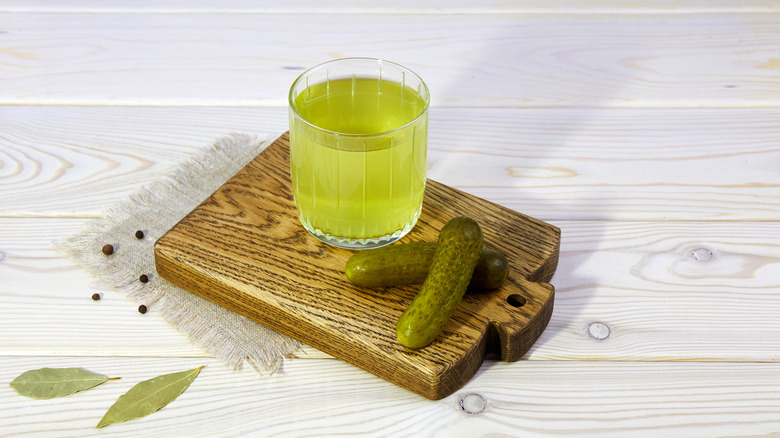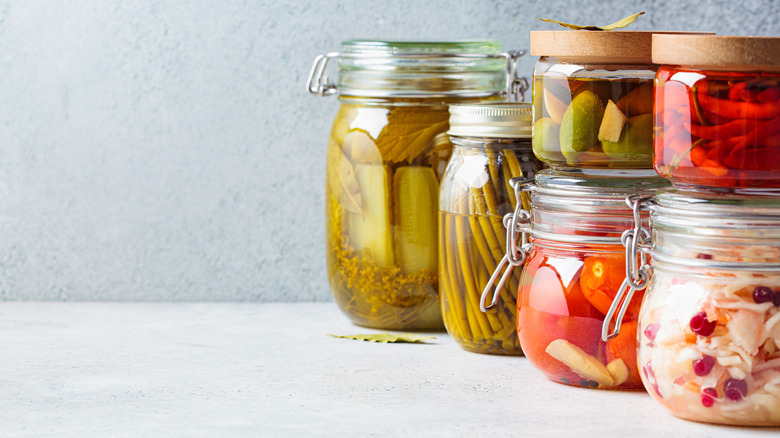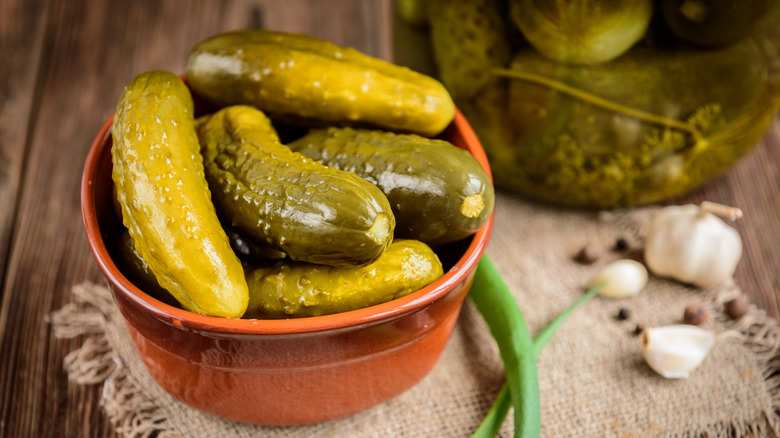False Facts About Pickles You Thought Were True
As a staple in many American pantries, pickles offer more than just a palate-cleansing effect, enhancing the rich flavors of your next bite. Intriguingly, a 2015 study published in Psychiatry Research suggests that frequent consumption of fermented foods, like these succulent, fermented veggies, might also help alleviate chronic social anxiety, providing a savory respite for individuals prone to high levels of neuroticism.
Everyone should have a favorite pickle, whether kosher dill, cornichons, or bread and butter chips. But even ardent pickle fans, who happily stack up jars on their pantry shelves, don't know that these crunchy and sour treats have been shrouded in myths for ages, adding an intriguing layer to the pleasure of your beloved pickle type.
Many so-called pickle facts thrive on half-truths you've probably never thought to question. Some people believe pickles have absolutely zero calories. Others believe a darker color means spoilage, while some think vinegar-soaked pickles are immortal. None of these alleged facts are true — so it's time we debunk them for good. Read on as we uncover false pickle facts you thought were true but are, in reality, myths worth challenging.
1. False: Pickles last forever
If you think those tangy, vinegar-drenched pickles in the back of your fridge can live forever and still taste great, think again. Pickles may seem like a forever food, and the vinegar's acidity or brine's salinity fuel this myth. Soaking pickles in acidic or salty solutions only wards off the growth of microorganisms — mainly bacteria and fungi — the usual culprits of spoilage. A vinegar bath is an age-old preservation method that significantly prolongs the shelf life of pickled and fermented foods, but not infinitely.
This myth also stems from the fact that pickles come in airtight jars that we typically store in cool and dark places, where they can sit for years without visible signs of decay. This longevity creates the illusion of pickles as eternal delicacies. But while pickles can certainly outlive many pantry foods, they have a limited lifespan and can eventually spoil.
Commercially pickled products can typically last for 12 to 18 months (the exact duration varies depending on the brand and storage conditions). However, always check the "best-by" or "use-by" date on the label for optimal quality and safety. Once opened, refrigerate pickles in brine or vinegar for 5 to 7 days to preserve their crunch, flavor, and freshness. Maintaining airtight storage in the fridge helps pickles stay fresh for longer. While pickled jars offer a long-lasting pantry staple, they're not an eternal snack.
2. False: Pickle juice is a magical hangover cure
Desperately sipping from the pickle jar after having one too many won't miraculously cure your hangover. This age-old belief that pickle juice is a hangover remedy has zero scientific backing and might even harm your health.
The reason people bite on this pickle myth is that alcohol, as a notorious diuretic, sends vital fluids and precious electrolytes like sodium and potassium on a one-way trip out of your body, leading you to nurse hangover symptoms such as nausea and fatigue. Naturally, sodium-rich pickle juice may seem like the ideal electrolyte booster and sobering agent. And maybe even the vinegar's sourness can trigger a gag reflex that expels alcohol from your system, right? You're wrong on both accounts.
There's little and conflicting evidence for pickle juice's hangover-curing effects. Some studies report minor relief, others none at all. The electrolytes are a reasonable explanation, but their actual uptake from pickle juice is doubtful. And the gag reflex idea? Just wishful thinking. Alcohol doesn't get ejected that easily, and the acidic pickle bite may worsen nausea. Hydration is the true hangover remedy, according to Thomas Waters, MD (via Cleveland Clinic), and sports drinks can significantly restore electrolytes quickly. Pickle juice is just a salty, sour distraction from your hangover misery, not a miracle solution.
3. False: Pickles are calorie-free and good for weight loss
Snacking on a pickle may seem harmless since pickles are just cucumbers soaked in vinegar, as well as being remarkably low in fat. This notion quickly spawns the common myth that pickles are a "zero calorie" food and a weight loss miracle — so what makes this myth stick like pickle juice to a dill spear?
It persists because pickles have a paltry 4 calories per spear, unlike other common burger toppings such as cheese or mayonnaise. In the realm of calorie counting, this number makes them appear almost angelic, but a jar can hold many spears. Indulging in too many pickles might not tip the calorie scale much, but their high sodium can lead your body to retain water, which may contribute to unwanted weight gain and bloating.
Moreover, the "zero calories" myth is often based on vinegar's alleged fat-burning power. Vinegar boasts potential health benefits such as controlling blood glucose levels and improving heart health (per Healthline), but there's no scientific proof for its fat-dissolving effects. This property is often attributed to apple cider vinegar, though it is also unlikely to be true. The truth is that these tasty, sour snacks are not a magic solution for weight loss. Eating them moderately as part of a balanced diet is fine, but don't make them your main weight-loss strategy — sustainable weight loss results from a holistic lifestyle, not just a jar of pickles.
4. False: Pickles are only made with vinegar
Nothing screams "pickles" like catching a strong whiff of vinegar from an open jar. The familiar sour taste of a traditional pickle is deeply ingrained in our understanding of fermented foods. So, it's tempting to believe that vinegar is the only ingredient involved in the pickling process.
The widespread misconception stems from the prevalence of commercially made pickles, which use vinegar as the main pickling agent. Vinegar's strong acidity is a preservative, delivering the signature sour punch we love. This pervasive notion can obscure the historical reality that pickling is an age-old art of food preservation with a rich array of techniques spanning different cultures and cuisines.
The truth is that pickles can also be soaked in brine (a salt solution), where time and beneficial bacteria aid their transformation. This lacto-fermentation process, similar to the one used in making Germany's superfood, sauerkraut, produces a distinct tangy and earthy flavor, contrasting with the sharpness of vinegar. Just think of brine-cured olives in the Mediterranean, kimchi, Korean cucumbers fermented in garlic and chili peppers, or Indian pickles brined in turmeric and mustard seed spices.
5. False: Pickles are a modern food trend
Seeing pickles on gourmet burgers, discovering quirky pickle-based challenges on social media, and encountering pickles with exotic flavors like kimchi or sriracha may give the impression that these juicy, sour treats are a recent craze. But if you peel back the modern pickle myth, you'll find a past as rich and fermented as the pickles on your pantry shelf.
Pickles are not a new invention. Archaeologists unearthed evidence of cucumber fermentation in ancient Mesopotamia, dating back to 2,400 B.C., tracing the rich history of this practice. The Romans also relished pickled vegetables, while the French, for centuries, have been perfecting their cornichons. And since the 18th century, pickles have been a kitchen staple in America, gracing tables alongside gourmet burgers and hot dogs.
So, while the pickle packaging and flavors in grocery stores may seem modern, the essence of the succulent, tangy treat remains timeless. Enjoying pickles is not just indulging in a trendy snack but also savoring a piece of culinary history with a remarkably long and vibrant past.
6. False: Dark-colored pickles have gone bad
A dark, murky pickle in a jar makes us reach for the more vibrant, greener pickle beside it. The belief that "off-color" pickles are spoiled is another surprisingly persistent myth, and it prevails because visual cues affect our perception of food.
We often associate bright colors with freshness, while darker shades signal spoilage. In the pickle world, the vibrant green of a fresh pickle is undeniably appealing, making a darker one raise suspicions. This mindset is further reinforced by the fact that many fruits and vegetables lose color and freshness as they age. So, it's easy to apply this logic to pickles, thinking the darkish color means they've gone bad.
The pickling process also fuels the myth. For instance, pickles soaked in spices like turmeric and mustard seeds boast a yellowish tint. As these spices fade, the pickle's color dulls, potentially appearing darker. This color change occurs due to the natural aging of the spices. While some discoloration can happen over time, it's often from the natural oxidation of the brined cucumbers. Pickles can darken for various reasons, but if they maintain a firm texture, don't have an off-putting odor, and show no signs of mold, they're perfectly safe to eat — regardless of color.
7. False: Pickles have no nutritional value
The widespread belief that pickles are nutritionally barren stems from their unfortunate pairing with sodium-drenched vinegar — a stark contrast to their potential as a healthy snack. Yes, the intense sodium in pickles is undeniable. A single pickle spear packs a surprising 300 milligrams of sodium, representing a not-so-trivial 13% of the daily recommended limit. Typically, high sodium levels are often linked with unhealthy junk food. So, with their salty reputation, it's easy to see why pickles seem to fit the bill perfectly.
Beyond masquerading as sodium bombs instead of nutritious snacks, many commercially produced pickles contain added sugars and preservatives. By some accounts, a low-calorie count means a negligible nutritional value; pickles, clocking in at a measly 4 calories per spear, are shockingly low in the calorie department — further fanning the flames of their unhealthy reputation.
But the juicy truth is that these sour snacks pack a surprising nutritional punch. Pickles are rich in vitamin K, which is important for blood clotting and bone health. They offer decent dietary fiber, too, keeping you full and your digestive system happy. As for those brine-soaked pickles brimming with good bacteria? They're probiotic powerhouses, boosting immunity and potentially even your mood. So, pickles aren't just salty sidekicks — they're a great source of nutrients. Enjoy them moderately and pair them with other nutritious foods for a well-rounded meal.
8. False: True pickles must bounce
Imagine dropping a dill pickle and watching it bounce back. It may sound amusing, but the scenario is puzzling. Yet, the peculiar "bouncy pickle" myth gained popularity following an incident in Hartford, Connecticut, in 1948. A pickle packer faced a hefty $500 fine for selling pickles deemed unfit for consumption because they failed to bounce when dropped. However, despite the incident, no law in Connecticut specifically states that a true pickle must bounce.
Pickles and other pickled produce, like fruits and vegetables, are protected under the state's Uniform Food, Drug, and Cosmetic Act, especially the statutes about contaminated food. The strange bounce test was merely a demonstration by the State Food and Drug Commissioner, Frederick Holcomb, to show consumers how to determine the quality of a pickle. The "bouncing pickle" law myth is so enduring that it has been cited in legal actions and has appeared in many books and websites.
But the truth is that no law in Connecticut requires this quality in a pickle, and the bounce test is not a legal requirement for selling pickles in the state. If you drop a pickle on your kitchen floor today, it's likely to split open or break. On a softer surface, it may just leave a nasty vinegar splatter. But a bounce? Not a chance.
9. False: Pickle juice has no use
Often dismissed as mere waste to pour down the drain, pickle juice is commonly believed to serve no purpose. This prevailing myth stems from viewing pickle juice as just a byproduct of pickles, leading many to assume that this potent liquid holds no nutritional value. Contrary to popular belief, pickle juice is a versatile ingredient with myriad uses, including adding a zesty kick to marinades, infusing depth and complexity to salad dressings, and serving as a meat tenderizer.
You can even elevate your next cocktail with pickle juice or use it as a creative substitute for vinegar in recipes. Furthermore, pickle juice boasts a high sodium content, which can help combat exercise-induced muscle cramps in athletes. Regrettably, the misconception that brine is "too salty to be useful" often overshadows these potential benefits. Beyond its tangy flavor, pickle juice is a probiotic drink with antioxidants that can boost immune function and aid digestion, according to Medical News Today.
A splash of pickle juice can also contribute to gut health and digestion by introducing beneficial bacteria into your digestive system. So, before throwing out leftover pickle juice, consider its amazing benefits. This precious liquid packs a zingy punch, offering a surprising array of uses. However, it's crucial to exercise moderation due to its elevated sodium content.
10. False: All pickles are sour
The myth that all pickles are inherently sour is largely rooted in the widespread popularity of sour pickles. But this commonly held belief doesn't hold up when you explore the vast assortment of pickles available. Various types of pickles exist, including dill, full sour, half sour, sweet pickles, bread and butter pickles, gherkins, cornichons, and pickled pepper pickles. While sour pickles ferment in saltwater brine, other pickles are made with vinegar, sugar water, or lemon juice.
Sour pickles indeed get their zesty sourness from the fermentation process, creating a mouth-watering tang with a lasting hint of salt. Sweet pickles, often made with a generous addition of sugar, offer a delightful sweetness that contrasts with the typical brininess. Bread and butter pickles, with a unique blend of sweet and tart notes, bring a complex flavor profile with hints of onions and spices like turmeric.
Half-sour pickles are less fermented for those who prefer a milder option, providing a crisp, fresh cucumber taste with a subtle sourness. Tiny and often spicier, gherkins pack a punch with flavors enriched by cloves, mustard seeds, and dill. Small and tart cornichons are typically served with rich meats and cheeses, adding a sharp, vinegary snap that cuts through the heaviness. As you reach for a pickle, remember — sourness is just one note in the symphony of flavors pickles boast.
11. False: Pickling is just for cucumbers
When we hear the word "pickle," most of us immediately think of succulent cucumber slices soaked in jars of vinegar. This perception has become so deeply ingrained in our minds that we often assume pickling is exclusive to cucumbers. Of course, cucumbers are ideal for pickling due to their firm texture and flavor absorption, making them a popular choice year-round. Their suitability for retaining crispness and widespread availability often overshadow the pickling potential of other foods, reinforcing the strong association.
But the truth is that pickling preserves and enhances various foods using brine or vinegar. Commonly pickled items include vegetables like carrots, beets, cauliflower, onions, and okra, fruits such as lemons and mangoes, and proteins like fish and chicken. Each item takes on a unique taste from the pickling process — carrots become tangy and crisp, mangoes sour-sweet, and meats develop a savory note. Even eggs can be pickled for a firm, seasoned snack.
The technique extends the shelf life and adds a distinct zest to these diverse foods. Understanding the true nature of pickling makes it clearer that the term "pickle" encompasses a much broader spectrum of preserved foods than just cucumbers.
